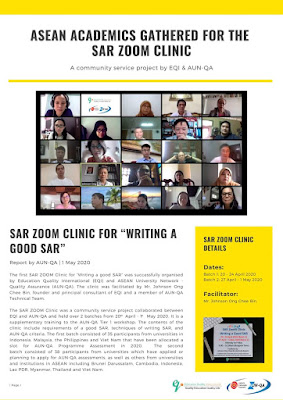In serving the mission of raising the quality assurance of higher education in ASEAN, the AUN-QA Network and Education Quality International (eqi) collaborated to hold online training workshops to raise the quality of SAR as part of their community service to the AUN-QA community in this unprecedented times of the COVID-19 pandemic.
The “SAR Clinic: Writing a Good SAR” was mooted and due to the overwhelming demands, the online training was held in two batches. The first batch was held from 20 to 24 April 2020 daily over 5 sessions (9.00 -10.30am - BKK Time) and the 2nd batch from 27 April to 1 May 2020 daily over 5 sessions (9.00 - 10.30am - BKK Time). A total of 73 participants from 46 universities and agencies in Brunei, Cambodia, Indonesia, Malaysia, Myanmar, the Philippines, Thailand and Vietnam attended the SAR clinic which was facilitated by Mr. Johnson Ong Chee Bin, the Principal Consultant of eqi and AUN-QA Expert and assisted by Dr. Nguyen Thi My Ngoc (Jenny), Vietnam National University-Ho Chi Minh City .
The learning outcomes for the SAR Clinic are listed and all of them were fully achieved at the end of the training.
1. Identify the AUN-QA Criterion requirements for writing
2. Apply the techniques for writing a good SAR
3. Improve the quality of good SAR for AUN-QA assessment
A survey was held at the each of each SAR clinic and at the survey showed a gain between 55% and 63% in knowledge and skills in SAR writing after the training. Feedback from the participants was positive and some of their feedback are listed below.
"After attending the course, I understand deeply the requirements of writing criteria, such as: defining life-long learning activities, doing internal and external benchmark for research activities, illustrating the constructive alignment, I will share these knowledge to my QA staffs and the faculties of our university so that they have a good preparation for the coming AUN-QA assessments and effective quality improvement plans as well."
"The discussion from the facilitator, the sharing on the difficulties in writing the different criteria of assessment and the examples given are good insights for me to consider in writing the SAR. In spite of the very short training time, the direct to the point suggestions are very enlightening that I can apply in my institution in writing the SAR for the upcoming assessment visit in the university."
"I benefited greatly from attending the writing a Good SAR training. AUN-QA Criteria, Challenges and suggestion learned from the course will be linked to the University's IQA team and will continue to be discussed."












